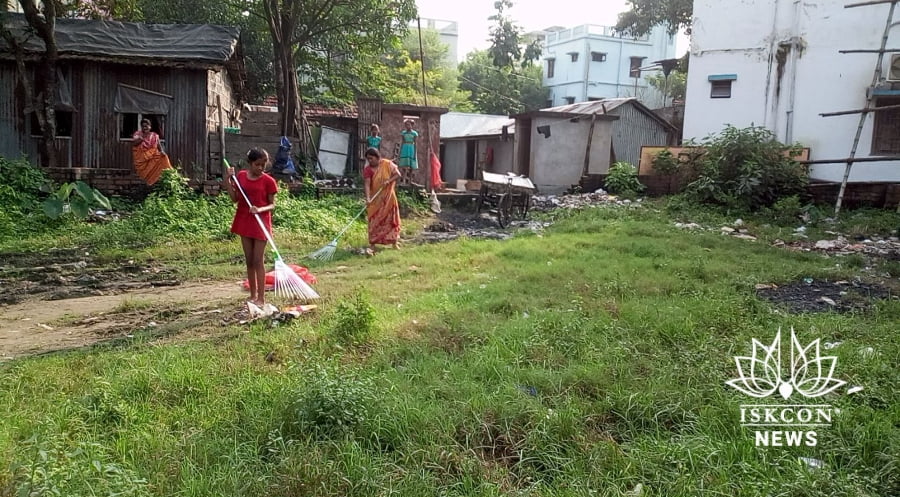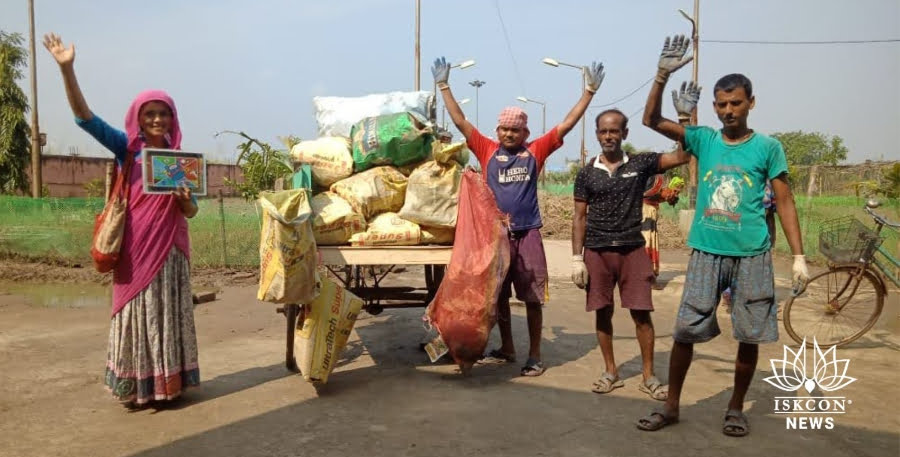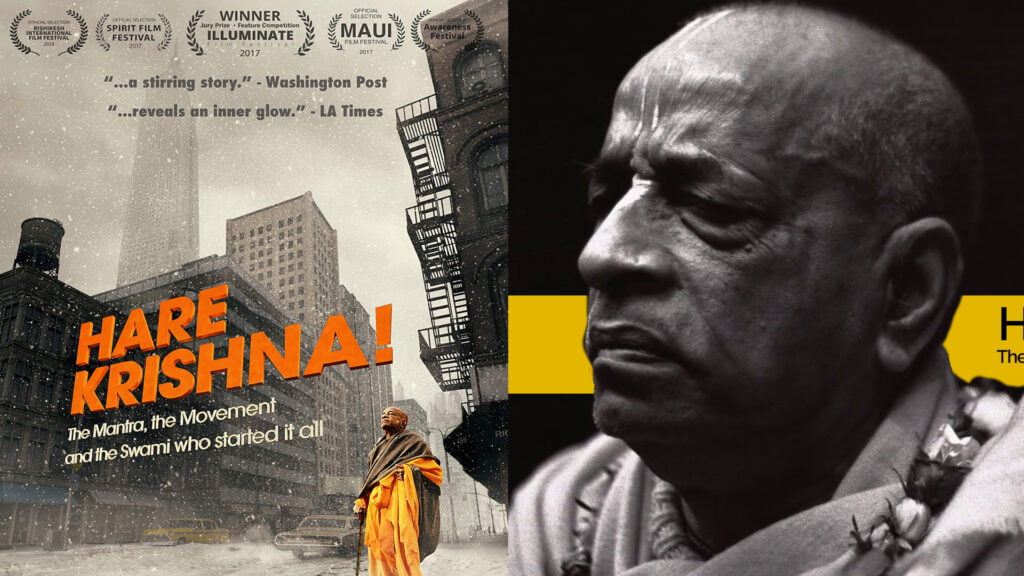 Today is the appearance day of Srila Raghunatha dasa Gosvami and many other acharyas and associates of Sri Chaitanya Mahaprabhu. Srila Raghunatha dasa Gosvami was born in a very aristocratic family in Bengal. His father and uncle, Govardhana and Hiranya Mazumdar, were wealthy landlords, or zamindars; they were almost like kings in opulence. But although Raghunatha dasa was their only heir, he had no attraction for material opulence and enjoyment.
Today is the appearance day of Srila Raghunatha dasa Gosvami and many other acharyas and associates of Sri Chaitanya Mahaprabhu. Srila Raghunatha dasa Gosvami was born in a very aristocratic family in Bengal. His father and uncle, Govardhana and Hiranya Mazumdar, were wealthy landlords, or zamindars; they were almost like kings in opulence. But although Raghunatha dasa was their only heir, he had no attraction for material opulence and enjoyment.
The Mazumdars’ family priest was Yadunandana Acharya, a disciple of Advaita Acharya. From the time Raghunatha dasa was a small boy, Yadunandana Acharya and Balarama Acharya, another friend of the Mazumdar family, would call him to sit on their laps. They would instruct him to chant Hare Krishna and tell him about Sri Chaitanya Mahaprabhu. So, from a very young age Raghunatha dasa developed the desire to join Sri Chaitanya. Namacharya Haridasa Thakura also visited Raghunatha dasa’s family, and he too was merciful to Raghunatha dasa.
One day, Raghunatha dasa left home and went to meet Sri Chaitanya Mahaprabhu. “I want to join You,” he told the Lord. But Chaitanya Mahaprabhu replied, “No. Don’t act like a crazy fellow. You should return home and be a good son, an expert businessman, and a proper husband, and then, when the time comes, the Lord Himself will arrange for you to become free from the bondage of family life.”
Lord Chaitanya used the term markata-vairagya. Markata means “monkey,” and vairagya means “renunciation.” Monkeys appear to be very renounced, because they live in the jungle, have no clothes or possessions, and eat only fruits and berries. But each monkey has two dozen girlfriends. Sri Chaitanya Mahaprabhu was instructing Raghunatha dasa, “Don’t be a monkey renunciant, making a show of renunciation when you still have material desires. Return home and act outwardly as an ordinary young man. And inwardly, develop your Krishna consciousness. Be detached internally and perform your external duties.”
So, on Sri Chaitanya Mahaprabhu’s order, Raghunatha dasa returned home. But within his heart he wanted to join Mahaprabhu. Raghunatha dasa’s parents were very worried that Raghunatha dasa, their only son, might leave home. So they kept guards at the gate to make sure he did not run away. One day, Raghunatha dasa got the idea to meet Nityananda Prabhu at Panihati. Once there, being extremely humble, he offered his obeisances from a distance. Lord Nityananda, being very merciful and humorous, said to Raghunatha, “You are just like a thief, staying at a distance. But now that I have captured you, I will punish you. You must make a festival for My associates and Me and feed us all chipped rice, yogurt, bananas, and milk.”
Raghunatha dasa bought all the cida (chipped rice), dadhi (yogurt), dugdha (milk), and fruits and sweets that were available in the market. Preparations were made using chipped rice, yogurt, milk, sugar, and bananas, and there were mangoes, sweets, and other items. Nityananda Prabhu and all the other devotees were very pleased.
When merchants heard about the festival, they came to Panihati to sell their goods. Raghunatha dasa bought all their dadhi, dugdha, bananas, and other items, made them sit down, and fed them the same items he had just purchased. Soon there were so many people that there was no place to sit. People began to sit on the bank of the Ganges, and when all of the space by the Ganges was occupied, they stood in the water and ate their cida-dadhi. At the end of the festival, Nityananda Prabhu was so pleased with Raghunatha dasa that He gave him a blessing.
We shall now read from Sri Caitanya-caritamrta, Antya-lila, Chapter Six: “The Meeting of Sri Caitanya Mahaprabhu and Raghunatha dasa Gosvami.”
TEXT 1
krpa-gunair yah kugrhandha-kupad
uddhrtya bhangya raghunatha-dasam
nyasya svarupe vidadhe ’ntar-angam
sri-krsna-caitanyam amum prapadye
TRANSLATION
With the ropes of His causeless mercy, Sri Krsna Caitanya Mahaprabhu employed a trick to deliver Raghunatha dasa Gosvami from the blind well of contemptible family life. He made Raghunatha dasa Gosvami one of His personal associates, placing him under the charge of Svarupa Damodara Gosvami. I offer my obeisances unto Him.
TEXT 138
tabe raghunathe prabhu nikate bolaila
tanra mathe pada dhari’ kahite lagila
TRANSLATION
Then, after the conclusion of the festival, Nityananda Prabhu called Raghunatha dasa near Him, placed His lotus feet upon Raghunatha dasa’s head, and began to speak.
TEXT 139
“tumi ye karaila ei pulina-bhojana
tomaya krpa kari’ gaura kaila agamana
TRANSLATION
“My dear Raghunatha dasa,” He said, “since you arranged the feast on the bank of the Ganges, Sri Caitanya Mahaprabhu came here just to show you His mercy.
TEXT 140
“krpa kari’ kaila cida-dugdha bhojana
nrtya dekhi’ ratrye kaila prasada bhaksana
TRANSLATION
“By His causeless mercy He ate the chipped rice and milk. Then, after seeing the dancing of the devotees at night, He took His supper.
TEXT 141
“toma uddharite gaura aila apane
chutila tomara yata vighnadi-bandhane
TRANSLATION
“Lord Sri Caitanya Mahaprabhu, Gaurahari, came here personally to deliver you. Now rest assured that all the impediments meant for your bondage are gone.
TEXT 142
“svarupera sthane toma karibe samarpane
‘antaranga’ bhrtya bali’ rakhibe carane
TRANSLATION
“Sri Caitanya Mahaprabhu will accept you and place you under the charge of His secretary, Svarupa Damodara. You will thus become one of the most confidential internal servants and will attain shelter at the lotus feet of Sri Caitanya Mahaprabhu.
TEXT 143
“niscinta hana yaha apana-bhavana
acire nirvighne pabe caitanya-carana”
TRANSLATION
“Being assured of all this, return to your own home. Very soon, without impediments, you will attain the shelter of Lord Sri Caitanya Mahaprabhu.”
COMMENT
As directed by Nityananda Prabhu, Raghunatha dasa returned home. Having lost all interest in family affairs, however, he no longer stayed in the inner section of the house, but moved to the outer courtyard. Late one night, the Mazumdars’ family priest and Raghunatha’s spiritual master, Yadunandana Acharya, came to Raghunatha and told him that a disciple who was supposed to worship the Deity had left his service, and he asked Raghunatha to induce that disciple to return. So Raghunatha dasa left the house with Yadunandana Acharya. The watchmen were asleep, and nobody had any fear, because they thought that Raghunatha had gone with Yadunandana Acharya to do some work and would soon return. On their way, Raghunatha dasa told his spiritual master, “I will go to that disciple and induce him to return to his service, so do not be in anxiety. You may return to your place.”
Yadunandana Acharya went home, and Raghunatha dasa thought that now he had the opportunity to escape. After he went to the disciple and sent him to do his service, Raghunatha proceeded toward Jagannatha Puri—not on the public road, because he knew that as soon as his family realized that he was gone, they would send people to catch him and bring him back—but along the interior paths. For twelve days he walked from Bengal to Puri, and on only three of them was he able to eat anything. But he did not mind, because he was absorbed in thoughts of Chaitanya Mahaprabhu—that finally he would be able to join Him in Puri. Raghunatha dasa’s parents sent ten men to find him and bring him back, but they could not trace him.
TEXT 186
bhaksana apeksa nahi, samasta divasa gamana
ksudha nahi badhe, caitanya-carana-praptye mana
TRANSLATION
Not caring about eating, he traveled all day. Hunger was not an impediment, for his mind was concentrated upon obtaining the shelter of the lotus feet of Sri Caitanya Mahaprabhu.
TEXT 189
svarupadi-saha gosani achena vasiya
hena-kale raghunatha milila asiya
TRANSLATION
When Raghunatha dasa met Sri Caitanya Mahaprabhu, the Lord was sitting with His companions, headed by Svarupa Damodara.
TEXT 190
anganete dure rahi’ karena pranipata
mukunda-datta kahe,—“ei aila raghunatha”
TRANSLATION
Staying at a distant place in the courtyard, he fell down to offer obeisances. Then Mukunda Datta said, “Here is Raghunatha.”
COMMENT
Mukunda Datta had been present when Chaitanya Mahaprabhu had sent Raghunatha dasa back home, so he was surprised: “Oh, the same boy has come again. Chaitanya Mahaprabhu advised him to remain at home, so how has he come?”
TEXT 191
prabhu kahena,—“aisa,” tenho dharila carana
uthi’ prabhu krpaya tanre kaila alingana
TRANSLATION
As soon as Sri Caitanya Mahaprabhu heard these words [“Here is Raghunatha”], He immediately welcomed Raghunatha dasa. “Come here,” He said. Raghunatha dasa then clasped the lotus feet of the Lord, but the Lord stood up and embraced him out of His causeless mercy.
COMMENT
Chaitanya Mahaprabhu was sitting with His most confidential associates, headed by Svarupa Damodara Gosvami, and they were discussing topics of Krishna. But as soon as Chaitanya Mahaprabhu heard “Raghunatha has come,” His mind was drawn to him. He left everything and stood up and embraced him.
TEXT 192
svarupadi saba bhaktera carana vandila
prabhu-krpa dekhi’ sabe alingana kaila
TRANSLATION
Raghunatha dasa offered prayers at the lotus feet of all the devotees, headed by Svarupa Damodara Gosvami. Seeing the special mercy Sri Caitanya Mahaprabhu had bestowed upon Raghunatha dasa, they also embraced him.
COMMENT
Raghunatha dasa saw not only Chaitanya Mahaprabhu but also all of Mahaprabhu’s confidential associates. And he offered obeisances at their lotus feet. And seeing how Sri Chaitanya Mahaprabhu was merciful to Raghunatha dasa and had embraced him, they all did the same.
TEXT 193
prabhu kahe,—“krsna-krpa balistha saba haite
tomare kadila visaya-vistha-garta haite”
TRANSLATION
Lord Caitanya Mahaprabhu said, “The mercy of Lord Krsna is stronger than anything else. Therefore the Lord has delivered you from the ditch of materialistic life, which is like a hole into which people pass stool.”
PURPORT by Srila Prabhupada
According to the law of karma, everyone is destined to suffer or enjoy according to a certain material standard, but the mercy of Lord Krsna is so powerful that the Lord can change all the reactions of one’s past karma, or fruitive activities.
COMMENT
According to our karma, we have to enjoy or suffer. But the Lord’s mercy is so strong that He can free us from any amount of suffering or material enjoyment. He can free us from all karma, whether punya (pious) or papa (sinful). He can lift us out of our material condition and place us on the spiritual platform, where there is no material enjoyment or suffering—only service.
PURPORT (continued)
Lord Sri Caitanya Mahaprabhu specifically drew attention to the mercy of Lord Krsna. That mercy is more powerful than anything else, for it had saved Raghunatha dasa from the strong bondage of materialistic life, which the Lord compared to a hole where people pass stool.
COMMENT
The bondage of material life is very strong. And usually, the more one is surrounded by material opulence, the harder it is for one to become free. Therefore, persons who are interested in spiritual life or liberation from material existence do not try to increase their material opulence, because their opulence may keep them bound to material existence. Srila Prabhupada himself told the story of how his father had helped him. When Prabhupada was of the age to be married, there were two proposals: one for him to marry a very beautiful girl and one for him to marry a not-so-pretty girl. Srila Prabhupada’s father advised him, “You should rather marry the plain girl, because later, when the time comes for you to leave family life, it will be easier if your wife is not so beautiful.” Srila Prabhupada took the advice, and in the end—as we know—he left everything to serve the order of his guru maharaja and preach Krsna consciousness. In the West there may be even more problems if the wife is beautiful. There used to be a popular song: “If you want to be happy for the rest of your life/ Get an ugly woman to be your wife.” Generally, the more one is surrounded by material opulence, the more one has trouble becoming free. But the mercy of Krishna is so powerful that even though Raghunatha dasa was surrounded by so much opulence (Nityananda Prabhu said that his opulence was like the king of heaven’s), such loving parents, and such a beautiful wife, he had no attachment to any of it. And he left it all to join Chaitanya Mahaprabhu. So Sri Chaitanya told him, “The mercy of Krishna is so strong that you could leave your material opulence and come here.” And He compared family life to a hole in which people pass stool.
PURPORT (continued)
Sri Caitanya Mahaprabhu gave His verdict that those addicted to the materialistic way of life are like worms that are living in stool but cannot give it up. A grha-vrata, one who has decided to live in a comfortable home although it is actually miserable, is in a condemned position. Only the mercy of Krsna can save one from such misery. Without Krsna’s mercy, one cannot get out of the filthy entanglement of materialistic life.
COMMENT
The worm lives in stool, eats the stool, and enjoys life. According to Sri Chaitanya Mahaprabhu, materialistic persons who want to enjoy the happiness of family life are like worms who want to enjoy the taste of stool. Of course, pure devotees can also be grihasthas, but here Sri Chaitanya Mahaprabhu is talking about materialistic enjoyment.
PURPORT (concluded)
The poor living entity cannot give up his materialistic position on his own; only when granted the special mercy of Krsna can he give it up. Lord Caitanya Mahaprabhu knew very well that Raghunatha dasa was already liberated. Nevertheless He emphasized that Raghunatha dasa’s life of material comfort as a very rich man’s son with a very beautiful wife and many servants to attend him was like a ditch of stool. The Lord thus specifically indicated that ordinary men who are very happy with material comforts and family life are in no better position than worms in stool.
COMMENT
Just see Chaitanya Mahaprabhu’s language. But He did not use the same language with everyone. He spoke as He did to Raghunatha dasa because of a special reason, as we shall now read.
TEXT 194
raghunatha mane kahe,—“krsna nahi jani
tava krpa kadila ama,—ei ami mani”
TRANSLATION
[Sri Caitanya Mahaprabhu had said, “By the mercy of Krsna you have been free from the bondage of household life, which is like a ditch where people pass stool.”] Raghunatha dasa answered within his mind, “I do not know who Krsna is. I simply know that Your mercy, O my Lord, has saved me from my family life.”
TEXT 195
prabhu kahena,—“tomara pita-jyetha dui jane
cakravarti-sambandhe hama ‘aja’ kari’ mane
TRANSLATION
The Lord continued, “Your father and his elder brother [Govardhana and Hiranya Majumadara] are both related as brothers to My grandfather [they were of almost the same age and had friendly relations with Sri Caitanya Mahaprabhu’s grandfather], Nilambara Cakravarti. Therefore I consider them My grandfathers.
PURPORT
Nilambara Cakravarti, the grandfather of Sri Caitanya Mahaprabhu, was very intimately related to Raghunatha dasa’s father and uncle. Nilambara Cakravarti used to call them his younger brothers because both of them were very devoted to the brahmanas and were very respectable gentlemen. Similarly, they used to call him Dada Cakravarti, addressing him as an elder brother brahmana. Raghunatha dasa, however, was almost the same age as Lord Sri Caitanya Mahaprabhu. Generally a grandchild may joke about his grandfather. Therefore Sri Caitanya Mahaprabhu took advantage of the relationship between His grandfather and Raghunatha dasa’s father and uncle to speak in a joking way.
TEXT 196
“cakravartira duhe haya bhratr-rupa dasa
ataeva tare ami kari parihasa
TRANSLATION
“Since your father and his elder brother are younger brothers of Nilambara Cakravarti, I may joke about them in this way.
COMMENT
Sometimes we may want to give an instruction to someone but not want him or her to take offense. So after we give the instruction, which may involve harsh words, we may say that we were just joking. Chaitanya Mahaprabhu was saying, “Don’t mind, because your father and uncle were friends of My grandfather, so they are like My grandfathers. I am only joking by comparing them to worms in stool.” But although He was joking, He was also not joking.
TEXT 197
“tomara bapa-jyetha—visaya-vistha-gartera kida
sukha kari’ mane visaya-visera maha-pida
TRANSLATION
“My dear Raghunatha dasa, your father and his elder brother are just like worms in stool in the ditch of material enjoyment, for the great disease of the poison of material enjoyment is what they consider happiness.
COMMENT
In other words, they are in such a diseased condition that the thing that is actually poison—sense gratification—they take as nectar.
PURPORT
When a man is attached to material enjoyment, he is attached to many miserable conditions, but nevertheless he accepts his condemned position as one of happiness.
COMMENT
This is maya, illusion. He is suffering, but he thinks he is enjoying.
PURPORT (concluded)
Sense enjoyment is so strong for such a person that he cannot give it up, exactly as a worm in stool cannot give up the stool. From the spiritual point of view, when a person is too absorbed in material enjoyment, he is exactly like a worm in stool. Although such a position is utterly miserable to the eyes of liberated souls, the materialistic enjoyer is greatly attached to it.
COMMENT
Liberated souls can see that the poor man is in a miserable condition, but the materialistic person is attached to his condition and cannot leave it. Srila Prabhupada had a disciple named Sudama Vipra, who was a rough character, a former member of Hell’s Angels. Once, when Srila Prabhupada arrived at a train station, maybe in Delhi, many people gathered around. The devotees performed kirtan, and Sudama Vipra began to preach. He said that before he came to India, he had thought that India was a very holy, spiritual place where everyone was inclined to spiritual life, and that he had expected to see beautiful mountains, forests, and rivers, and people engaged in spiritual consciousness. But when he had actually come to India, to the cities, he had seen that people were wretched, living in filth, poverty, and misery; he had also seen many lame people, deformed people, and lepers, all suffering. He said, “To the eyes of a pure devotee like Srila Prabhupada, all of us look just like those wretched people—poor, filthy, diseased, and miserable in so many ways. A pure devotee like Srila Prabhupada sees all of us like them, and naturally he feels compassion.” And at the end of the talk, Srila Prabhupada remarked, “He has spoken very nicely.” Here Srila Prabhupada says something similar in relation to how Chaitanya Mahaprabhu saw Raghunatha dasa’s father and uncle, who lived in great material opulence—how such a position is utterly miserable to the eyes of liberated souls but the materialistic enjoyer is greatly attached to it.
TEXT 198
“yadyadi brahmanya kare brahmanera sahaya
‘suddha-vaisnava’ nahe, haye ‘vaisnavera praya’
TRANSLATION
“Although your father and uncle are charitable to brahmanas and greatly help them, they are nevertheless not pure Vaisnavas. However, they are almost like Vaisnavas.
COMMENT
Raghunatha dasa’s father and uncle were kind to devotees and brahmans. They used to practically maintain the whole brahman community of Bengal, and they were friendly with such exalted devotees as Balarama Acharya, Yadunandana Acharya, and Haridasa Thakura. But because they still desired to enjoy material life, they are not considered pure devotees, suddha-vaisnavas. Chaitanya Mahaprabhu calls them vaisnavera praya, which means they are “like Vaishnavas,” or “almost Vaishnavas.” Pure devotional service is without any desire other than to serve Krishna (anyabhilasita-sunyam). It is not covered by fruitive work, impersonal speculation, or anything else (jnana-karmady-anavrtam). So, they were not pure devotees. They performed pious deeds and religious activities, but their aim was to enjoy material life.
As devotees, we also may be surrounded by material things, and because of habit we may not be able to serve enthusiastically without them. Srila Prabhupada gave the example of a famous barrister, C. R. Das, who gave up everything to join India’s freedom movement. But he was so used to a high standard of living that he could not do without it—and within one year he died. He could not live as a mendicant. So, if one prematurely tries to renounce his material situation, he may become disturbed—or even die. Thus Sri Chaitanya Mahaprabhu generally advised, sthane sthitah sruti-gatam: Remain in your position and hear the messages of Krishna from the mouths of pure devotees; then you can gradually advance.
Here, because Raghunatha dasa was a liberated soul, Sri Chaitanya Mahaprabhu was speaking to him in a way befitting an advanced Vaishnava—although earlier He had advised him to return home.
PURPORT
As stated by Srila Bhaktivinoda Thakura in his Amrta-pravaha-bhasya [his commentary on Sri Caitanya-caritamrta], some people, usually very rich men, dress like Vaisnavas and give charity to brahmanas. They are also attached to Deity worship, but because of their attachment to material enjoyment, they cannot be pure Vaisnavas. Anyabhilasita-sunyam jnana-karmady-anavrtam. The pure Vaisnava has no desire for material enjoyment. That is the basic qualification of a pure Vaisnava. There are men, especially rich men, who regularly worship the Deity, give charity to brahmanas, and are pious in every respect, but they cannot be pure Vaisnavas. Despite their outward show of Vaisnavism and charity, their inner desire is to enjoy a higher standard of material life.
COMMENT
In the West, we have little experience of persons who actually follow the principles of Vaishnavism but desire to enjoy material facilities. When I first came to India and met such persons, I became somewhat confused. There was one man who owned a textile mill—a follower of Vallabhacharya. He was very pious, very charitable, and he invited me to his house. So, I went to visit him, on Carmichael Road. He had a very nice temple room, and as a follower of Vallabhacharya he worshipped Bala Krishna—there was so much paraphernalia for the worship. He was also one of the trustees of the Vallabhacharya temple in Bombay, so he wanted me to visit the temple, and I accompanied him there. Many grihastha bhaktas were singing bhajanas in the temple, and it was very opulent. I was confused, because they seemed to be following everything—they were vegetarian, followed all the rules and regulations for worshipping the Deity, and gave money in charity—but still there was something different about them. So, I was a bit confused. But now we can understand: although they were religious and charitable, they still had the desire to enjoy material opulence; they were not pure devotees.
PURPORT (concluded)
Raghunatha dasa’s father, Govardhana, and uncle, Hiranya dasa, were both very charitable to brahmanas. Indeed, the brahmanas from the Gaudiya district were practically dependent on them. Thus they were accepted as very pious gentlemen. However, they presented themselves as Vaisnavas to the eyes of people in general, although from a purely spiritual point of view they were ordinary human beings, not pure Vaisnavas. In other words, they were kanistha-adhikaris, for they were ignorant of higher Vaisnava regulative principles. Nevertheless, they could not be called visayis, or blind materialistic enjoyers.
COMMENT
They were not pure devotees, but at the same time they were not blind materialistic enjoyers. They were in-between. So they are called vaisnava-praya, bhakta-praya, or kanistha-adhikari. They were on the material platform, because they wanted material enjoyment, but at the same time they had faith in Krishna and Vaishnavas, and they worshipped Krishna and served Vaishnavas. So they were vaisnava-praya.
TEXT 199
“tathapi visayera svabhava—kare maha-andha
sei karma karaya, yate haya bhava-bandha
TRANSLATION
“Those who are attached to materialistic life and are blind to spiritual life must act in such a way that they are bound to repeated birth and death by the actions and reactions of their activities.
PURPORT
As clearly stated in the Bhagavad-gita (3.9), yajnarthat karmano ’nyatra loko ’yam karma-bandhanah: if one does not act as a pure devotee, whatever acts he performs will produce reactions of fruitive bondage (karma-bandhanah). In Srimad-Bhagavatam it is said:
nunam pramattah kurute vikarma
yad indriya-pritaya aprnoti
na sadhu manye yata atmano ’yam
asann api klesada asa dehah
“A materialistic person, madly engaged in activities for sense enjoyment, does not know that he is entangling himself in repeated birth and death and that his body, although temporary, is full of miseries.” (SB 5.5.4)
A visayi, a person blindly caught in a web of materialistic life, remains in the cycle of birth and death perpetually. Such a person cannot understand how to execute pure devotional service, and therefore he acts as a karmi, jnani, yogi, or something else, according to his desire, but he does not know that the activities of karma, jnana, and yoga simply bind one to the cycle of birth and death.
COMMENT
In other words, without bhakti no one can be liberated. Not even a yogi or a jnani, what to speak of a karmi, can be liberated without the mercy of a devotee, without the touch of devotional service.
TEXT 200
“hena ‘visaya’ haite krsna uddharila toma’
kahana na yaya krsna-krpara mahima”
TRANSLATION
“By His own free will, Lord Krsna has delivered you from such a condemned materialistic life. Therefore the glories of Lord Krsna’s causeless mercy cannot be expressed.”
PURPORT
In the Brahma-samhita (5.54) it is said, karmani nirdahati kintu ca bhakti-bhajam. Lord Krsna is so merciful that He can stop the reactions of karma for His devotee. Everyone—from the small insect called indra-gopa up to Indra, the king of heaven—is bound by the reactions of fruitive activities.
yas tv indra-gopam atha vendram aho sva-karma-
bandhanurupa-phala-bhajanam atanoti
karmani nirdahati kintu ca bhakti-bhajam
govindam adi-purusam tam aham bhajami
Everyone, whether an insect or the king of heaven, Indra, is entangled and bound by the actions and reactions of his karma. However, when one becomes a pure devotee, free from material desires and from bondage to karma, jnana, and yoga, one is freed from material actions and reactions by the causeless mercy of Krsna. One cannot express sufficient gratitude to Krsna for being freed from the materialistic way of life.
COMMENT
Raghunatha dasa Gosvami is the ideal example for us to follow. When he was a householder, he showed the ideal example of how to live in household life, how to execute one’s duty perfectly and at the same time be detached from material enjoyment and attached to Krishna. Later, after he joined Sri Chaitanya Mahaprabhu, he showed the ideal example of renounced life. He hardly ate or slept, and he was always engaged in chanting the holy names, offering obeisances, and other such activities. So, he is a rare example of a devotee who set the ideal standard for both grihasthas and sannyasis.
We pray for his mercy.
Srila Raghunatha dasa Gosvami ki jaya!
Srila Prabhupada ki jaya!
[A talk by Giriraj Swami on Srila Raghunatha dasa Gosvami’s appearance day, February 4, 1996, Juhu, Bombay]






 By Bhakti-lata Dasi
By Bhakti-lata Dasi 



 By Vijaya Dasa
By Vijaya Dasa






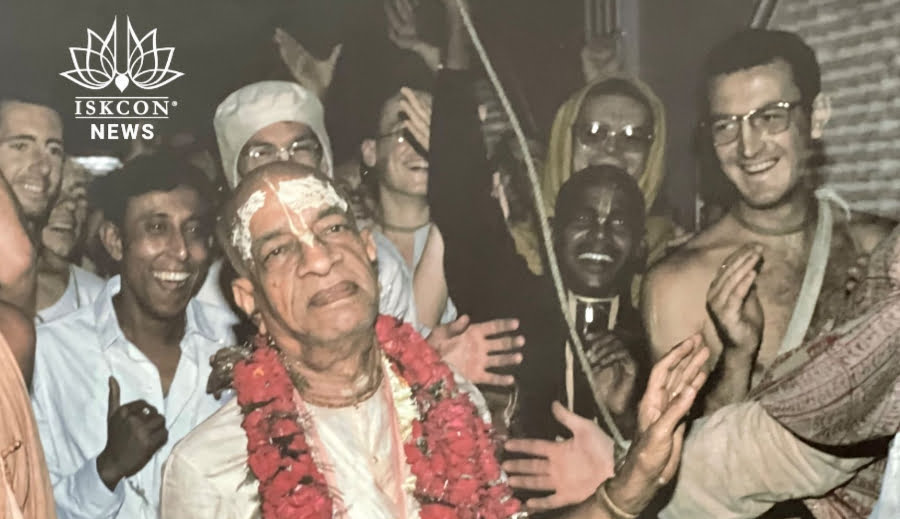
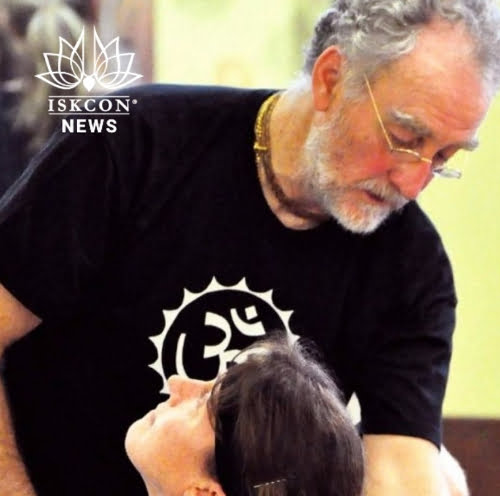
 By Vishakha Devi Dasi
By Vishakha Devi Dasi By the GBC
By the GBC By Ananda Tirtha das
By Ananda Tirtha das